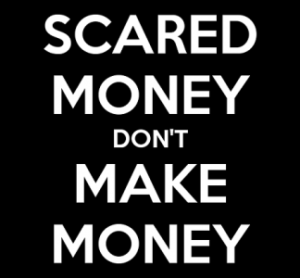 The single biggest reason you’re not making a living trading is because you feel like you have to making a living and you’ve gone ‘all in’ with your capital and emotion.
The single biggest reason you’re not making a living trading is because you feel like you have to making a living and you’ve gone ‘all in’ with your capital and emotion.
You might assume that your failure to achieve financial success as a trader is due to not yet discovering a revolutionary trading system or a set of secret strategies that guarantee profits. However, the truth is far simpler, and it’s not likely to be any of the other reasons you’re currently assuming. The harsh reality is that the primary cause of your inability to trade for a living is self-imposed pressure to make money.
Below are four common mistakes made by traders that generate excessive self-imposed pressure, making it too difficult to overcome:
1. Bleeding “Chips”
In poker, a significant loss of chips is referred to as “bleeding chips”. In trading, this translates to insufficient capital to sustain our trading strategy over a long period and generate profits.
Traders with small trading accounts often impose unnecessary pressure on themselves to increase their capital quickly, leading to over-trading and high-risk trades. Starting with a small account and growing it is not a problem, but unrealistic expectations of achieving rapid growth and becoming a full-time trader within months are doomed to fail. However, there are options available to prevent this.
If you have limited capital, you can approach trading in two ways:
- Acknowledge that limited capital means smaller position sizes and controlling risks to avoid losing your trading account entirely.
- Believe that a few large trades can double or triple your account, allowing you to manage risk better later.
Although the former is the better option, most traders with small accounts choose the latter due to the temptation of quick growth. However, slow and steady trading is the key to success in the long run, regardless of your initial aspirations.
Therefore, if you have limited capital, you must trade slowly and manage risk properly. Success is possible with a small account, but it will take time and patience to develop good trading habits, leading to better profits and lower emotional stress. On the other hand, ignoring this advice will lead to a trading rollercoaster, with blown accounts and damaged relationships as the most likely outcomes.
2. Scared money
 The second factor that contributes to the pressure a trader experiences is trading with “scared” money. This type of money refers to funds that should not be put at risk in the market or money that does not belong to the trader. It is not uncommon for novice traders to use loans from family members or even credit cards to fund their trading accounts, but this is a careless and ill-advised approach.
The second factor that contributes to the pressure a trader experiences is trading with “scared” money. This type of money refers to funds that should not be put at risk in the market or money that does not belong to the trader. It is not uncommon for novice traders to use loans from family members or even credit cards to fund their trading accounts, but this is a careless and ill-advised approach.
Because the trader understands the potential negative consequences of losing that money, trading with scared money results in heightened emotional attachment to the funds being risked. If a trader cannot afford to risk actual funds, it is imperative that they accept this reality and refrain from live trading until their financial situation changes. In the meantime, traders can continue to learn and practice trading through demo accounts. Failure to acknowledge the risks associated with trading with scared money is akin to setting the money on fire, as losses are highly likely.
3. The pressure of needing to succeed
The pressure to succeed can be a significant obstacle for traders, just as it can be for business owners. When you feel like your trading success is a make-or-break situation, the resulting mental pressure can be overwhelming, even for the most disciplined and patient traders. Successful traders understand this pressure and have found ways to mitigate it.
One approach is to wait until you have enough risk capital to trade without emotional attachment to the money at risk. Alternatively, you can remain realistic about your small trading account and use proper risk management techniques to grow it over time. The key is to find a way to reduce or eliminate the pressure of needing your trading to succeed.
To do this, you need to have a clear and calm trading mindset with little emotional attachment to the money you’re risking. This means having a solid Plan B, such as a job that covers your monthly bills and allows you to save money each month. Trading is risky, and it’s crucial to ensure that you can afford to trade without putting unnecessary pressure on yourself. If you can’t get yourself into the correct pressure-free mindset, it’s best not to start trading with real money until you find a way to do so.
4. Lack of proper experience or education
 The most common way that traders add unnecessary pressure on themselves in the market is by trading live without enough experience or education. When we lack proper experience or education, we inherently feel pressured to perform because the task seems more difficult than it would be with adequate training.
The most common way that traders add unnecessary pressure on themselves in the market is by trading live without enough experience or education. When we lack proper experience or education, we inherently feel pressured to perform because the task seems more difficult than it would be with adequate training.
Traders who attempt to trade with real money without first obtaining proper training and experience tend to feel significantly more pressure and emotion than those with a solid trading education and 3 to 6 months of demo trading. Many traders mistakenly believe that they can “learn as they go” and start making consistent profits right away. However, this approach inevitably leads to blowing out their trading account.
Trading is no different from any other profession in that you must first obtain the necessary education and experience. It is borderline madness to think that you can step into the market with little to no experience or education and expect to make consistent profits. Just as you would not expect to fly an airplane with little to no experience, you cannot trade properly without significant pressure and stress if you do not first obtain training and experience.
Education is the key to reducing pressure and allowing you to trade for a living, just as education is the key to solving almost any problem in life.

